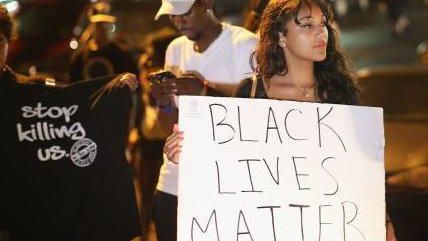Poll: 59% of Democrats Say Criminal Justice System Treats White Americans More Fairly Than Minorities, 62% of Republicans Say System Treats All Equally


On Monday, protesters in Ferguson, MO continued their fourth day of renewed protests over the police shooting of an unarmed black teenager, Michael Brown. Protestors brought signs and t-shirts with slogans including "Black Lives Matter" and "My Blackness is Not a Weapon." The incident has reignited public debate over accountability and racial bias in the nation's police departments and the criminal justice system more generally.
The latest Reason-Rupe poll finds 44 percent of Americans believe the criminal justice system in the United States treats white Americans more fairly than black and Hispanic Americans. Another 45 percent believe the system treats all racial groups the same, 6 percent think the system favors black and Hispanic Americans, and 5 percent aren't sure.
When it comes to perceptions of systemic bias in the criminal justice system, Democrats are significantly more likely to perceive bias than Republicans and independents. Fifty-nine percent of Democrats believe America's criminal justice system treats white Americans more fairly than minorities; only 35 percent think the system treats all fairly. In stark contrast, 62 percent of Republicans believe the system treats everyone equally under the law, while 26 percent say white Americans are treated better. Independents are divided with 40 percent who say the justice system is fair, and 37 percent who believes it's biased against minorities.
African-Americans and Hispanics are also significantly more likely than white Americans to perceive systemic bias. Fully 83 percent of African-Americans and 62 percent of Hispanics say whites are treated more fairly than minorities. Only 34 percent of white Americans agree that the system gives them preferential treatment; instead, 53 percent believe the system treats all Americans equally.
Younger Americans are much more likely to perceive bias in the system than older Americans, and this cannot be fully explained by greater diversity among younger cohorts. Among 18-34 year olds, 54 percent say the justice system is biased in favor of white Americans, while 40 percent think it treats everyone the same. Americans 35-54 are evenly divided with slightly more (47%) perceiving bias than equal treatment (42%). However, among Americans over 55, a majority—52 percent—says the justice system is fair to everyone, 34 percent perceive a bias in favor of Caucasians.
There is even a slight difference between men and women on perception of bias. A plurality (49%) of women believes white Americans are treated more fairly and 40 percent think the justice system treats all equally. Conversely, 50 percent of men believe the system is fair, and 39 percent believe white Americans are treated more fairly.
Reason-Rupe also finds that Americans living in urban areas are more likely to perceive unequal treatment in favor of Caucasians in the criminal justice system: 55 to 37 percent. In suburban areas, a plurality (47%) believes the system is fair to everyone while 41 percent perceive a bias against minorities. Conversely, a majority (54 percent) of Americans in rural areas say the criminal justice system treats everyone the same, while 34 percent perceive a bias in favor of white Americans.
When we compare these results to the average elected official, such as those in Congress, we find that politicians come from the very demographic groups least likely to believe there is bias in the criminal justice system:
The average member of Congress in 2014 is 57 years old, college-educated, male, and Caucasian. Using a statistical technique, we find a person with the same demographics as the average member of Congress has a 65% chance of believing the criminal justice system in America is fair to all racial groups. In contrast, a similar nonwhite female who is 40-years-old is 26 percent likely to agree.
Basically, those in elected office are most likely to come from demographic groups least likely to detect bias in the criminal justice system. This may help explain why Ferguson residents are so upset—they feel those in power do not believe them nor care about them.
This does not mean that one group is necessarily completely right while the other is completely wrong. This also does not suggest that racial animus implicitly drives those who don't perceive bias in the system. However, the very presence of these stark demographic and partisan differences incontrovertibly merits our close attention. Yet, these very differences are what make constructive debate over criminal justice reform so challenging.
America stands for equal treatment under the law predicated on the belief that all individuals' share inherent equal dignity. However, these tenants are nothing more than empty promises if the state's most powerful tool—its police power—is misused or applied inconsistently. If police power is misapplied, partisan and racial perception differences make it even more difficult to have a constructive debate about it. Until there is greater mutual willingness to listen to the experiences of others, reform and renewal may remain elusive.
The Reason-Rupe national telephone poll, executed by Princeton Survey Research Associates International, conducted live interviews with 1004 adults on cell phones (503) and landlines (501) October 1-6, 2014. The poll's margin of error is +/-3.8%. Full poll results can be found here. including poll toplines (pdf) and crosstabs (xls).


Show Comments (23)